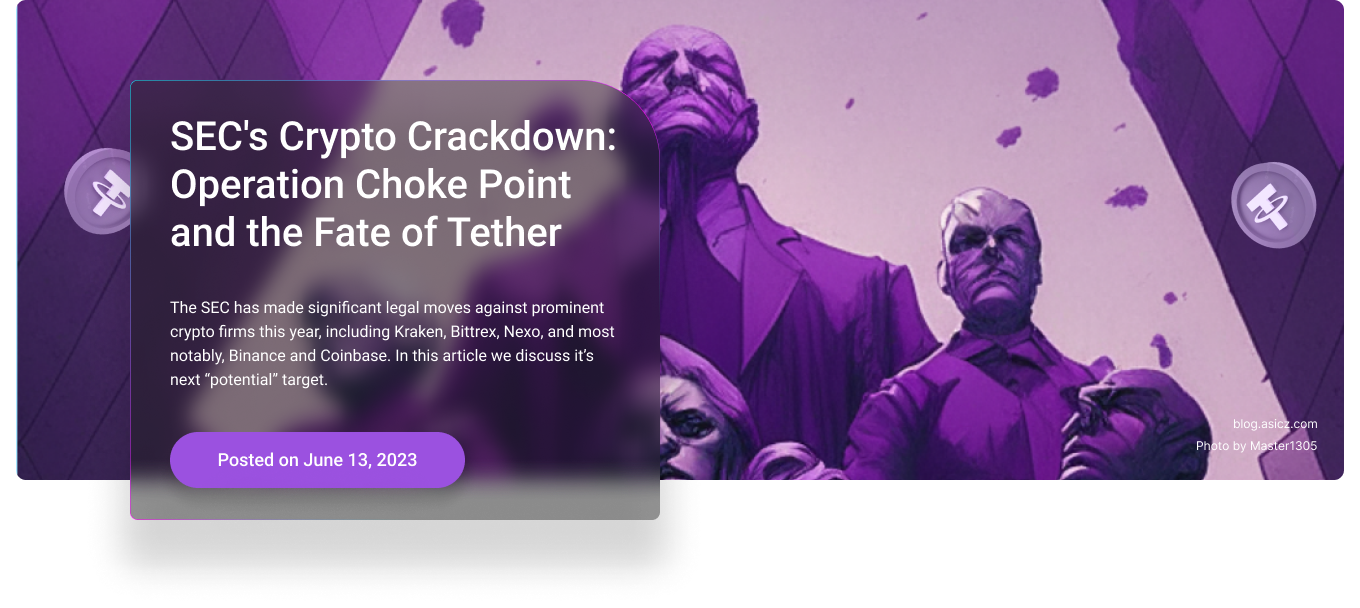In a wave of aggressive regulatory actions, the US Securities and Exchange Commission (SEC) has targeted key players in the crypto market, leaving the industry speculating on the fate of Tether (USDT), the largest stablecoin. This Trickster Tuesday article delves into the SEC’s crackdown, explores the notion of “Operation Choke Point,” and examines the potential repercussions for stablecoins. Additionally, we discuss the similarities with China’s approach before launching their Central Bank Digital Currency (CBDC) and the potential impact on other countries.
The SEC’s Crypto Crackdown and “Operation Choke Point”:
The SEC has made significant legal moves against prominent crypto firms this year, including Kraken, Bittrex, Nexo, and most notably, Binance and Coinbase. These enforcement actions allege unregistered exchanges, offering of unregistered securities, and misleading practices. The lawsuit against Coinbase is particularly intriguing, as the platform has actively sought clearer crypto regulations from the SEC who themselves approved its IPO. The mounting complaints and lawsuits have given rise to suspicions within the crypto industry, sparking talk of a coordinated effort dubbed “Operation Choke Point.”
Is Tether the Next Target?
While the existence of “Operation Choke Point” remains speculative, the possibility of the SEC targeting Tether raises concerns. Tether, accounting for 76% of all stablecoins on exchanges, holds immense influence over crypto liquidity. Analysts argue that the SEC could potentially disrupt the entire market by focusing on Tether, effectively choking the industry’s liquidity. The criticism surrounding Tether’s lack of regulatory oversight and meaningful audits adds fuel to the debate, raising questions about the veracity of its claims to back each USDT token with one US dollar.
Drawing Parallels with China’s CBDC Launch:
Examining China’s approach to crypto regulation before launching its CBDC provides valuable insights. China similarly cracked down on crypto, by banning mining, clamping down on exchanges, and tightening regulations, ultimately paving the way for their digital yuan. The similarities between China’s strategy and the SEC’s actions show a potential correlation between regulatory crackdowns and the introduction of a Central Bank Digital Currency. This sheds light on how other countries might follow suit.
Potential Implications for the Crypto Industry:
Stablecoins, like Tether, play a vital role in the market, bridging the gap between traditional fiat and digital currencies. A regulatory assault on stablecoins could have far-reaching consequences. The SEC’s classification of BUSD, Binance’s stablecoin, as an “unregistered security” further heightens the possibility of future attacks on stablecoin issuers. The potential impact of SEC action towards USDT will affect liquidity, investor confidence, and the overall stability of the crypto market.
The SEC’s relentless crackdown on the crypto market has left industry players grappling with uncertainty and speculation. While the existence of “Operation Choke Point” remains unconfirmed, its potential implications on stablecoins, including Tether, cannot be overlooked. Drawing parallels with China’s strategy before launching their CBDC sheds light on possible motives and outcomes. As the industry adapts, regulators and market participants must work collaboratively to establish a balance between innovation, consumer protection, and market stability.
As the SEC’s regulatory grip tightens, uncertainty looms over the future of crypto. Navigating these challenging times requires adaptation, innovation, and advocacy for clearer regulatory guidelines. Amidst the evolving landscape, AsicZ stands as a trusted resource, offering a vast selection of volume mining equipment and Mining as a Service (MaaS) solutions. If you would like to learn more, visit AsicZ.com or reach out to the team at team@asicz.com.

